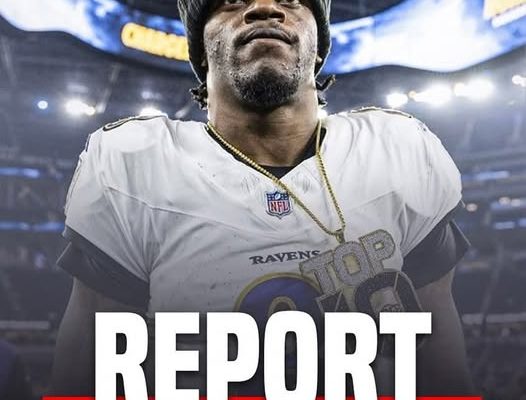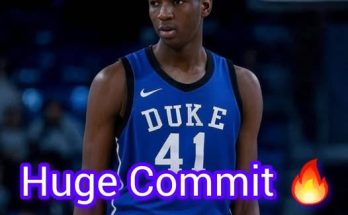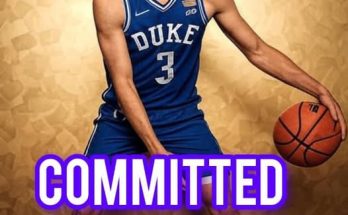Baltimore Ravens quarterback Lamar Jackson has always been more than just a football player. His electrifying play style, MVP-caliber performances, and leadership in Baltimore have made him one of the NFL’s most recognizable stars. But like many elite athletes, Jackson’s brand extends beyond the football field. His image, jersey, and signature number 8 are part of a broader personal brand that has become a valuable commodity in the sports apparel market. That is precisely why his legal dispute with Hall of Fame quarterback Troy Aikman captured attention last year, when Jackson filed a trademark lawsuit centered on the use of the number 8. Now, after months of speculation, Jackson has officially dropped the lawsuit, bringing an end to one of the more unusual clashes between NFL greats from two different eras.
The origins of the lawsuit go back to 2024, when Lamar Jackson alleged that Troy Aikman, who famously wore number 8 during his Hall of Fame career with the Dallas Cowboys, was using the number in connection with apparel in ways that caused consumer confusion. Jackson’s legal team argued that fans looking for Lamar Jackson apparel, particularly jerseys, shirts, and merchandise featuring the number 8, were being misled by products connected to Aikman. In their view, Aikman’s use of the number risked diluting Jackson’s growing apparel brand. Jackson’s jersey has consistently been one of the NFL’s top sellers, and with his MVP performances, his number 8 has become iconic in Baltimore and across the league. The legal claim was that Aikman’s connection to apparel bearing the same number created overlap that could undermine Jackson’s brand.
For fans, the lawsuit seemed almost strange at first glance. After all, Aikman had retired more than two decades earlier and had long since built his identity in broadcasting and commentary rather than sports apparel. His association with number 8, however, is undeniable. Aikman is one of the most iconic quarterbacks in NFL history, leading the Cowboys to three Super Bowl victories and earning a permanent place in Dallas lore. His jersey, number 8, remains one of the most popular throwbacks for Cowboys fans. That fact alone created friction when Jackson moved to secure stronger trademark rights over his apparel line. Both men are linked to number 8 in very different eras, and while Jackson is the modern-day star building a brand in the digital and merchandising age, Aikman’s legacy still holds enormous weight among fans who purchase retro gear.
As the case developed, legal analysts weighed in, suggesting that Jackson’s lawsuit might face hurdles because numbers themselves are not typically subject to exclusive trademark protections in the sports world. What can be trademarked is the association of a number with a specific player’s name, brand, or logo. For example, Michael Jordan’s 23 is inextricably linked with his name and Jumpman brand, while Kobe Bryant’s 8 and 24 are associated with his “Mamba” identity. Jackson sought to carve out a similar level of association, ensuring that when fans saw a number 8 jersey or piece of apparel in the football context, they would immediately connect it to him rather than anyone else. However, because Aikman’s association with the same number long predated Jackson’s NFL career, the courts would have to consider the historical significance of both players and whether Aikman’s use of number 8 in any modern branding context created genuine confusion.
What became increasingly clear over time was that the lawsuit was becoming more symbolic than substantive. While Jackson’s camp argued about the potential for brand dilution, Aikman had no active apparel business directly competing with Jackson’s. His occasional presence on throwback merchandise was primarily driven by the Cowboys’ official licensing deals, which have long included jerseys and memorabilia of their Hall of Fame players. In that sense, Aikman wasn’t trying to profit off the current NFL market or Lamar Jackson’s rising brand but rather simply enjoying the residual popularity of his legacy as one of Dallas’s all-time greats.
Dropping the lawsuit seems to indicate that Jackson and his team realized the uphill battle they faced in court. Legal experts pointed out that proving consumer confusion in this case would be extremely difficult. Cowboys fans buying throwback Aikman jerseys are unlikely to believe they are purchasing Lamar Jackson merchandise, just as Ravens fans buying Jackson apparel are not confusing it with retro Cowboys gear. Moreover, the fact that Aikman’s career ended in 2000 meant that his commercial presence in the football merchandise market was more nostalgic than competitive.
By withdrawing the lawsuit, Jackson avoids a prolonged legal battle that could have distracted from his brand rather than strengthened it. Public perception is a key component of athlete branding, and the lawsuit had the potential to make Jackson appear overly aggressive in protecting a number that is historically significant to more than one player. While Jackson certainly has the right to defend his commercial identity, fighting a Hall of Famer who never directly competed against him on the field created a narrative that wasn’t necessarily favorable. With the lawsuit dropped, Jackson can redirect attention to the positive growth of his personal brand and his continued dominance on the field.
From a broader perspective, the case highlights the evolving world of athlete branding and trademarks. In past decades, NFL players relied heavily on team contracts and endorsements for income, but modern athletes are increasingly turning their jersey numbers, logos, and personal mottos into intellectual property. LeBron James’s “King James,” Tom Brady’s “TB12,” and Steph Curry’s “SC30” are all examples of athletes building multimillion-dollar enterprises around personal branding. Jackson’s attempt to secure trademark protections for his number 8 fits into that larger trend. He recognizes that his number, paired with his name, carries enormous market value and wants to ensure it is protected against misuse. Even though his battle with Aikman has ended, Jackson’s pursuit of brand security will almost certainly continue in other ways.
Another layer to the story is the generational crossover between Aikman and Jackson. Aikman is part of the old guard, a quarterback from the 1990s when NFL stars were global icons but did not have the same personal control over branding. Back then, the Cowboys as a franchise held much of the merchandising power, and Aikman’s number 8 was sold primarily through official team and league channels. Jackson, on the other hand, plays in an era where athletes are entrepreneurs as much as they are competitors. Social media, online retail, and direct-to-consumer models give him tools that Aikman never had during his playing career. This generational divide partly explains why Jackson felt compelled to legally challenge Aikman’s association with number 8—it wasn’t about competition on the field but about shaping the modern business of athlete identity.
Fans of both players reacted in different ways when the lawsuit was first filed. Some Ravens fans supported Jackson’s stance, arguing that his number had become uniquely his in the modern era and deserved protection. Cowboys fans, however, viewed the lawsuit as unnecessary, pointing out that Aikman’s legacy with number 8 was cemented long before Jackson entered the league. The public debate reflected a broader question in sports: can a jersey number belong to one player in perpetuity, or is it always going to be shared across generations? For example, no one confuses Steve Young’s number 8 with Kobe Bryant’s number 8, because the sports and contexts differ. But when two football legends wear the same number, the overlap becomes more contentious.
Ultimately, Jackson’s decision to drop the lawsuit may prove to be the smartest move in the long run. It allows him to protect his image without creating prolonged conflict with a respected Hall of Famer. It also enables him to focus fully on his on-field performance and the Ravens’ pursuit of a Super Bowl, which will only enhance his legacy and, by extension, his brand. The reality is that Jackson’s marketability is tied less to legal battles and more to his ability to continue dazzling fans with his dual-threat brilliance. Every highlight run, every clutch throw, and every playoff victory makes his number 8 more iconic, regardless of who else wore it in the past.
In many ways, this situation underscores how sports culture continues to evolve. Athletes are not just athletes anymore—they are brands, business owners, and influencers. With that comes the complexity of intellectual property, trademarks, and legal disputes that were once unheard of in professional sports. Jackson’s clash with Aikman might be over, but it offers a case study for future athletes looking to protect their numbers, names, and images in an increasingly competitive branding world. For now, Jackson can move forward knowing his number 8 has already cemented itself in the hearts of Ravens fans everywhere, and that distinction is one that no lawsuit can truly determine.



